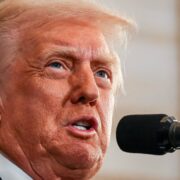
Bitcoin’s value soared to new heights this week, extending a post-election surge as President-elect Donald Trump vows to boost cryptocurrencies. Wealth advisers and personal finance experts say they’re hearing from more people taking a fresh look at the market, but their advice remains: Dip a toe in, don’t dive headfirst.
“My POV on the risks and benefits of bitcoin hasn’t changed much, if at all,” said Samuel Deane, president and CEO of Deane Wealth Management, a financial advisory firm. “Though the incoming administration is pro-crypto right now, I’ve seen enough in politics to know that can change at any time.”
The price of bitcoin traded north of $100,000 late last week after clearing the six-figure threshold for the first time Wednesday, as investors bet on the next administration resetting the rules for an industry that has drawn scrutiny from regulators.
Trump, who swiftly took credit for the bitcoin milestone, named billionaire investor David Sacks a White House “crypto czar” and tapped crypto advocate Paul Atkins to lead the Securities and Exchange Commission. The president-elect wrote on his social media app that Atkins “recognizes that digital assets & other innovations are crucial to Making America Greater than Ever Before.”
But for ordinary investors, the same old tenets apply, Deane said. While he’s a long-term bitcoin investor himself, clients who’ve added crypto to their portfolios are “doing it on their own after we establish the proper guardrails,” he said.
“First understand the basics of bitcoin as a decentralized digital currency,” he advised, which includes taking stock of its volatility. The token was trading at around $43,000 back in January and hovered around $70,000 days before the election — but around this time two years ago, it cost just $17,000. Investors have to decide if they can stomach such big swings, Deane said.
“This is something that’s been going on forever as it relates to the cryptoverse,” said Lee Baker, founder and president at Claris Financial Advisors. “You get these quick run-ups, but then you get some very sharp pullbacks. The thing you have to caution clients and other investors is that, ‘Hey, listen, you’ve got to be real careful to do this stuff in small doses.’”
Baker said his firm has received “multiple queries” from clients looking to learn about bitcoin as it surged following Trump’s win, but he’s heard more interest lately in other coins such as XRP, the cryptocurrency of the Ripple blockchain network, as well. He said he advises first-time crypto investors not to allocate more than 2% of their portfolios to bitcoin.
Bitcoin-based exchange-traded funds can help limit direct risk and are often a good place to start, Baker said. These options are new, but there are already plenty of popular ones to choose from, such as the Grayscale Bitcoin Trust, which launched last year after the company won a lawsuit against the SEC that helped open the door to bitcoin ETFs. Some of those investment products have exploded since Trump’s re-election.
Yet, Federal Reserve Chairman Jerome Powell spoke skeptically of bitcoin this week, saying that it’s still widely treated “as a speculative asset.”
“People are not using it as a form of payment or as a store of value. It’s highly volatile,” he said. Contrary to what advocates have long argued, “it’s not a competitor for the dollar, it’s really a competitor for gold,” he said at a DealBook conference Wednesday.
Deane also sounded a note of caution amid the recent excitement: “Not every investment that does well needs to be a part of your portfolio.”
Crypto devotees, though, are feeling buoyant. Leaders in the space have credited Trump for bitcoin’s surge, heralding a new era of looser regulation after SEC Chairman Gary Gensler’s impending Jan. 20 exit.
Gensler, who was appointed by President Joe Biden, has taken a hard-line approach to cryptocurrencies, which have contributed to a spate of cybercrimes and scams that the FBI says cost consumers billions of dollars last year alone. Under his leadership, the commission tried and failed to block bitcoin ETFs from hitting the market and also took major crypto exchanges to court in recent years, part of a controversial effort to assert more control over the sector.
For the crypto industry, “Gensler’s departure in and of itself was a positive,” said Isaac Boltansky, a director of policy research at the financial firm BTIG. “There will be a sea change ideologically at the commission and throughout government,” he predicted.
If confirmed by the Senate to a five-year term succeeding Gensler, Atkins is expected to take a similarly aggressive stance — just in the opposite direction, Boltansky said. He’ll be aided by two sitting commissioners, Hester Peirce and Mark Uyeda, who previously worked with Atkins during his earlier stint at the SEC during the George W. Bush administration.
But despite the personnel changes, there are “still jurisdictional battles” to come, Boltansky warned, noting that the agency and the Commodity Futures Trading Commission have sometimes stepped on each others’ toes over crypto regulation. “There are too many cooks in the kitchen, and they can’t agree on what they’re cooking,” he said.
He added that the key question of whether cryptocurrencies should be classified as securities is still being worked through in the courts, beyond the reach of federal regulators. The answer will determine whether they can be treated like stocks. But Boltansky said the next Congress, which will be narrowly Republican-led, is at least likely to deliver more clarity on stablecoins, a type of cryptocurrency whose value is pegged to that of another currency or commodity such as the dollar.
In the meantime, prospective investors should think through how and whether crypto fits into their existing progress on other financial goals, said Kevin Mahoney, a certified financial planner and founder of Illumint, a millennial-focused firm. Try to avoid being put “in a much less stable financial situation, or you’ve missed out on some of the other longer-term investments that you wanted to make, because you put too much in,” he said.
Rather than bet on what the government may or may not do, “I’d rather have my clients focus on what we know to be true, or what historical stock market data, for example, tells us is likely to be true,” he said. “That’s often going to be much more empowering for them and much more likely to succeed.”















